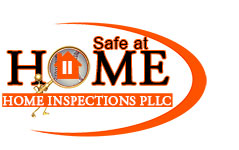About Safe at Home NWA Home Inspectors
Servicing Northwest Arkansas and surrounding areas including: Bentonville, Rogers, Centerton, Gentry, West Fork, Springdale, West Fork, Prarie Grove, Farmington and Fayetteville, Arkansas.
A true understanding of a home is best accomplished if the inspector has significant building experience. The ability to clearly and accurately report the findings comes with years of inspecting experience and an ability to relate to the individual customer on their level, according to the customers needs.
In the 80’s and 90’s, Steven Rehbock owned Crescent Homes Inc., which built quality custom homes. As a custom home builder, Mr. Rehbock direcdtly ran construction crews as well as sub- contracted, building as many as a dozen homes at a time. In Early 2003, Steven Rehbock became a licensed Home Inspector. In addition this wealth of practical experience, Mr. Rehbock has completed well over one hundred hours of classroom training specific for Home Inspection during the past 13 years.
With Safe at Home – Home Inspections, you can rest assured that your future home has been inspected to the fullest extent possible, and inspection results arereported in an easy-to-read format. The report contains pictures and a complete explanations of any issues with the property. This comprehensive report becomes a valuble reference for your home, and may contain details mechanical units (brand, model, serial number), as well as other important information such as location of shut off valves for utilies.
Our Home Inspection and Commercial Building Clients:
Do you know what a home inspector really does ? is supposed to do ?
I have found that many clients desire to know more about what the home inspector is supposed to deliver. I would like to help clarify
A home inspector reports the conditions of the home at the time of the inspection to the client.
Sounds really simple, yes. How about some details and comparisons to clarify further.
A home inspector does not PASS or FAIL a home, conditions are reported. A good inspector will put these conditions into an easy to understand summary and report. Not all conditions are negative. I deliver an easy to read report with a summary page. The report is long, but contains an energy section at the end. Most pages are real easy to read in large print with pictures to clearly illustrate the point being made.
A home inspector is not a code inspector. —- A code inspector will pass or fail according to a set of absolute minimums. Code inspectors do not have to be licensed, it is easier to pass a home than fail one. A home inspector abides by national best practices and a code of ethics. I mention this because the largest falicy I hear is that a home inspection is not needed on a new home because the city inspected it, or they had a reputable builder. I was a builder, a good one. a responsible one. But simply put the contract obliges the builder to build to minimum codes and they mostly do. Get a home inspector before you contract with the builder and oblige the builder to build to national best practices in the contract. If you do this, your home will be built to a higher standard. National best practices are documented and understood by all trades. See any trade website on a national level, or the home inspectors national websites for details.
A home inspector will not determine the price or value of the home, that is an appraisor.
A home inspector inspects the whole home, yes everything from the foundation to the roof. the structure plumbing, heating etc. Ok, there are exceptions. The client needs to clearly know what these are. A report is supposed to point all exceptions out. Simply, they are: low voltage wired systems, anything not attached to the home, asthetics, anything that presents a possible safety hazard (in the inspectors mind) to view and anything that is concealed.
What is considered concealed ? now this varies by inspector, I will move small items and get to places I know that many inspectors will skip. The book says that nothing is to be moved, not a leaf or ceiling tile or a piece of futniture. Nothing is to be damaged in any way to look behind it. The only scew that can be turned is the ones attaching the electrical cover panel. Note that this pretty much prevents all access to the inside of anything.
The above paragraph illustrates how important it is to know the inspectors background. Licensing just started well after the year 2000. Many people (about half) took a class to pass the test and are now inspecting who had no relevant prior experience. Simply put, get an inspector that built custom homes. That experience enables an inspector to be good. Some that have lengthy trade experience are also good. Stay away from the half of the inspectors that have no significant experience.
A home inspector reports the condition – he may or may not find a cause. If more investigation is needed, the home inspection refers to an expert in that area. All such referals present a problem in the real estate contract because they usually take longer to complete than the contract allows for. A good inspector with experience in building can almost always tell you what you need to to do get it fixed with out calling a specialist for additional information. Know the background of the home inspector. Be confident that if your inspector tells you you need more analysis, you really do.
How should the conditions be reported? The book says that they have to be in writing. Wow that is a low bar to hurdle. I see that several local inspectors do just that. No pictures. Boxes are checked or not checked on forms that take about 20 minutes to complete. Please look at my sample report, or at least a sample page or 2. I can honestly say that I use the most powerful home inspection reporting system called 3D. I spend more time writing the report than I spend in the home.
What might I see on a home that is important to a client? One of the most common problems I find is simply a leak. About one in 4 homes leaks. Leaks have a life cycle, they start one day, they get worse, they do damage, then the owner sees the damage and gets the leak fixed. The majority of home owners I see are honest people whowant to sell a quality home in good shape, when I find a leak, it is usually before it causes much damage. It is rarley a roofing problem, rather a condensation issue from the A/C in the attic. The most common electrical issue I see (about half the houses) is loose outlets(common cause of house fires) or incorrect breaker sizes, generally on the A/C or heating units. Usually too large. Why is this important ? It passes local code, it shows no problem until it is too late. A transformer blows or a lightning hits nearby. The A/C unit data label says that the max breaker should be a certain size, lets say 20 amp. The electrician installed a 50 amp. It works great for years, then the surge comes, destroys the A/C unit before the breaker cuts the power. Insurance investigates and does not cover the problem because it was not installed correctly.
There are hundreds of things I look for in detail. I report the conditions in a summary page at the start of the report. I report Major/ significant issues and minor/other conditions. About one in ten houses has no major/significant issues. Every home has conditions or minor issues. I often hear that the inspector will always find something, I guess that is true if you considor the minor stuff. From my perspective it is pretty simple, just report the conditions, report them correctly and in perspective. The home with no major issues is like throwing a shutout in baseball, I guess I am still waiting to see the perfect game. I can go on with the baseball analagies, after all this is SAFE at HOME – home inspections.
Above all, Safe at Home – Home Inspections is commited to providing a complete and accurate Home Inspection. Please take a look at one of the sample reports listed on this web site. Safe at Home – Home Inspection uses a reporting system that incorporates pictures and simple clear descriptions of the Home Inspection.
Community well being
Safe at Home’s, home Inspectior not only performs quality professional Home Inspections, Safe at Home – Home Inspections is proud to support the community through donations to local charities and childrens sports teams. Safe at Home – Home Inspections serves the community by giving generous discounts to seniors and first time home buyers. Safe at Home’s home inspectors are members of the community they serve. Today many Home Inspection companies have gone to national chains and lost some of their community relationships.
Reports and expertise
Safe at Home – Home Inspections typical client is a home purchaser of a new or existing home. Our clients normally have a contracted window of time to have a home inspection performed and completely reported on.
In a hurry ? Safe at Home – Home Inspections can even deliver your completed report to you on-site, immediatly following the inspection. The completed home inspection report contains information beyond the state requirements, which other inspectors don’t take the time to include, such as a complete list of all brand, model and serial numbers of appliances and mechanical units.
Safe at Home – Home inspections can also deliver your completed report through email, or regular mail to any parties you authorize.
A Home Inspection can be priced directly from this web site. However, please feel free to call with any questions or to price and schedule directly on the phone.479-422-1797
Servicing Northwest Arkansas and surrounding areas including: Bentonville, Rogers, Centerton, Gentry, West Fork, Springdale, West Fork, Prarie Grove, Farmington and Fayetteville, Arkansas.

